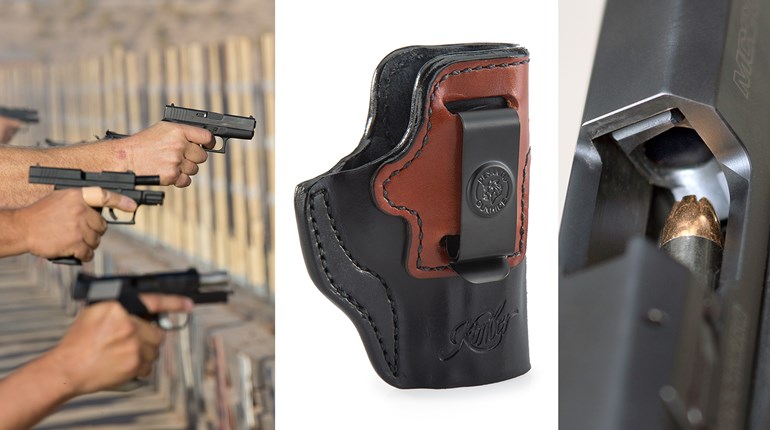
Lawful, peaceable citizens in Europe are getting it from both directions today.
On one side, suicidal, murderous Islamic terrorists are attacking with increasing ferocity and lethality—from Belgium to Denmark to France to who-knows-where tomorrow. On the other side, European Union officials are seeking to further disarm the law-abiding people who, more than in living memory, need firearms to defend themselves from those attacks.
But in an encouraging development, gun owners, concerned citizens and even government officials in Europe are uniting to oppose those renewed citizen-disarmament efforts—and gun control faces resistance on the continent not seen in generations. How any of these schemes is supposed to disarm criminals or terrorists—who traffic in every contraband imaginable—is anybody’s guess.
It’s the same thing we see here in the United States: politicians who exploit crime and terrorism to try to convince people to give up their God-given right and ability to defend themselves, and ordinary citizens who know from bloody experience that the politicians’ promises of protection are lies, and who demand that governments not interfere with their last, best hope to defend life and limb, hearth and home.
After last November’s terrorist attacks in Paris, the European Union stepped up its plans to impose additional gun controls under the rubric of the European Firearms Directive, which governs firearm ownership, trade and use by citizens of the 28 member nations of the EU, which stretches from Ireland to Finland and Portugal to Greece.
Under the current European Firearms Directive, established in 1991 and amended in 2008, fully automatic firearms are banned, semi-automatic firearms require special authorization and other firearms are required to be declared by their owners.
However, the so-called European Commission—the executive branch of the EU, akin to the presidential administration here in the U.S.—is now pushing to add more restrictions to the Firearms Directive, requiring member nations to adopt minimum standards of gun control.
Among the proposed changes:
- semi-automatic firearms would be treated the same way as fully automatic firearms are now, effectively banned from civilian use;
- all firearms and their owners would be required to be databased in national registries forever, instead of the current 20 years;
- firearms licenses would be valid for no more than five years.
What any of these schemes have to do with criminals, who will always get guns, just as they will always get narcotics or any other kind of contraband—or ISIS terrorists, who traffic in everything from machine guns to military high explosives—is anyone’s guess.
On Feb. 23, the Internal Market and Consumer Protection Committee of the European Parliament held a meeting for a “first exchange of views” on the proposals. As the legislative arm of the European Union, akin to our U.S. Congress, the European Parliament can adopt the European Commission’s proposals, amend them or reject them.
A “working document” prepared for that February meeting expressed a number of reservations about the proposals, noting in its introduction, “It is important to recognize that the vast majority of owners of firearms in the EU do not present any danger to the public. Any necessary changes to the 1991 Directive must be necessary, proportionate and targeted.”
Indeed, committee chair Vicky Ford, of the UK’s Conservative Party, said that the legislation was “poorly drafted” and “needs a lot of work.”
On March 15, the committee held another hearing on the proposed changes, and the legislation is set for consideration on April 20. Might the Europeans form an NRA of their own to stand and fight for their first birthright as free people? It’s likely their best defense.
The bad news, at this writing, is that the working document goes even beyond the European Commission’s recommendations for new gun controls, and suggests exploring additional anti-gun laws, including bans on magazines based on their capacity; so-called “safe storage” mandates that render firearms useless for self-defense; additional record-keeping, reporting and restrictions on ammunition sales; and additional requirements for individuals to be issued firearms licenses, including medical and psychological testing and proof of “need” to possess a firearm.
The good news, however, is that in some ways, proposed amendments in the working document are less onerous than what the European Commission proposed. For example, one proposed amendment would exempt from further regulation individuals who serve in a reservist or militia role for their nation’s defense. Another proposed amendment would narrow the categories of semi-automatic firearms that would be barred from civilian use.
If anything, these positive signs demonstrate that Europeans increasingly view the right to arms not as a threat to public safety, but rather the best defense of their safety, their freedom and their peace of mind in an increasingly dangerous world.
Indeed, as NRA’s Institute for Legislative Action has reported here, in the face of increasing terrorist attacks and waves of refugee immigration and violence, European citizens from Austria and Germany to Finland and England are fueling a boom in sales of firearms and other self-defense products, overwhelming authorities with requests for new licenses and gun registrations, and coalescing into a broad coalition—made up of shooting and hunting groups, members of the firearms industry and even military officials rightly concerned for their national security—to stand and fight for their rights.
Could the European Union form a new National Rifle Association of its own to fight for the first birthright of free people across the continent? It might be their best defense.
At this point, the situation is fluid and in flux. But whatever happens at the European Parliament’s April 20 meeting on the European Firearms Directive, we’ll keep you posted here.


































